

Eytan Buchman of Freightos sat with Robert Khachatryan, CEO of Freight Right, and discussed:
How midsize forwarders fit into the broader industry’s evolution
Building an internal culture of experimentation – tech and non-tech
The role that software sourcing (and development?!) should play in a forwarder toolkit
& more.
You can watch the full video on our YouTube channel.
Freightos
All right, okay well thanks everybody for coming and appreciate waiting extra minute I was about ready to start somebody ringing the doorbell at the office. And didn't seem like anyone was getting it, so I went to get it . Anyway, great to be back - it's been a couple of weeks since our last episode of future of freight. And this is, I think I say this every time, that this is going to be an exciting one and it's one I've been looking forward to for a while. So just as a reminder, if this is your first future of freight, this is a series we've been doing for a little bit over a year and a half now. It really started as a series of interesting conversations about what the future of freight looks like and that sounds like a very broad topic, because it is, there's a lot of different aspects that I really enjoy diving into whether it is how carriers are changing, how quoters are changing, the exporter experience is changing, and of course what's happening on the side of technology. Today we're going to dive into the independent freight forwarder in the future and and in order to discuss that I'm excited to Robert, Robert "catch a train" right? Am I butchering the pronunciation?
Robert
That's pretty good.
Freightos
Okay I'll take it. A 7 out of 10 is all I really aim for most days, so just as a way before I ask Robert to introduce himself: Roberts been a friend of Freightos for years now; we've always had the pleasure of bouncing different ideas off Robert probably going good six or seven years at least and always been really helpful to get the perspective of somebody who understands with freight and technology that's why I think he's such a good person to have on the show today so first Robert maybe you tell us a little bit about yourself and about Freight Right, and then we can dive in.
Robert
Yeah thanks for having me on Eytan. I founded the company in 2007. So in the middle of a recession, and that determined the future of the company; the DNA of the company, which basically is a lot of frugality and efficiency. In an industry where there's not a lot of. So we're based in Los Angeles, it's a team of about 65 people and the team is spread out worldwide but it's a rapidly growing company - double digit growth every year for the last maybe 10 years or so, some of those years almost doubling in growth.
Freightos
Okay yeah. Super cool to hear, and I think that first of all, the idea for frugality, and this is something that we can definitely dive into soon, because with the rise of like VC-backed companies that are kind of throwing their gauntlet, they're gone and trying to compete and then large enterprise organizations that are out there. I think that ability to differentiate becomes interesting, so I it's certainly something that that will dive into soon. And just rules of kind of engagement for for viewers, please, these are much more fun when they're a conversation, so if any questions pop up that you have please feel free to drop them in the Q &A time section on Zoom, and I will, in turn, feel free to ignore them if I don't like the question.
So just a really, really quick word about Freightos. For those of you don't know the Freightos group built a digital payment coding and billing platform that connects across carriers, freight forwarders, importers & exporters. I pray for orders are huge part of our business whether it's on the web carter's where we can have the carriers on the greatest common side, where can facilitate that connection to importers and exporters. And I think the independent freight forwarder or will here has been so interesting for us because sometimes larger enterprise organizations feel like they have the full in-house capability to make connections, sometimes, but I think independent variable orders and the influx and technology or that has appeared on the on the independent forwarder, whether it's in-house, SaaS or platform has really created a lot of new opportunities and the very least had people kind of reassessing how they're working.
And using that as a jumping off point for me the number one question which we could probably Robert speak about her for half an hour in of itself. In there is a lot of new players that have joined the industry and, if you go back to 2007, probably the list of top 20 global freight corridors changed a little bit, but but you'd have a large company say DSV and over the past 10 years there's been a whole wave of mergers and acquisitions and roll ups to make those major company even larger. In addition, you have these out of left field scares maybe scares I don't I don't know how you how you perceive it, but these larger tech companies that. kind of look at the supply chain, from the outside, or international from the outside, think it's an easy rapid revenue opportunity or something that they can do better than anybody else and move in there. Then you have, especially over the past year or two, carriers that have increasingly gotten their eye on going after the smaller and mid sized shipper and that's not even talking about digital freight forwarders or freight marketplaces this whole other cast of characters that are out there that suddenly, and I think if you're a freight forwarder. And a specific type of freight forwarder to order it like create opportunities and it might show that there's a lot of growth in supply chain but it's also maybe a little bit scary and I think it's such an interesting starting point, from your perspective you've been doing this for a long time, so I went back to 2015, but if you go back to 2007 and the ecosystem, back then, how has the competitive landscape, for you changed, and what does that mean for you?
Robert
Yeah it's definitely a whole different list of forwarders compared to when we started. I mean there's obviously been a lot of consolidations, especially with the bigger companies which I say to an average independent forwarder is probably not all that important because they compete for different kinds of customers. For us, with our growth trajectory and with our aspirations, we do compete with them and we aspire to compete with them more for larger and larger customers and for us it's actually a welcome change the consolidations because I mean we basically have fewer companies to compete with, and if a customer is upset with one of the top 25 forwarders then they don't have as many choices to go to anymore, whereas a few years ago that number was much larger. From 2007 it's a completely different, I would say landscape. Back then. there weren't as many differentiators. So for us, the bigger the top 25 get, the easier, it is for us to compete with them if that makes sense.
Freightos
Yeah and it probably makes sense because the the smaller large trade folders that are getting snapped up that might have been a little bit closer to the. Competition on the independent voter side suddenly aren't there you just mentioned differentiation and that may be, technology technology as a differentiator i'm super curious right now, when you approach, a shipper. What are the different parameters that that you actually have to talk about differentiation because it's clearly I think last year was probably "can you move my goods, whatever the cost is?", but what are the actual parameters and differentiation that you look at when you're going after a shipper?
Robert
Yeah so that has changed quite a bit since 2020 or 2019 which is pretty sad because I'm in a cluster of forwarders in this industry who are very tech-oriented. We always value technology, it's always been a differentiator and then in 2020 with the pandemic, with all the progress made in this industry, it seems to have gone out the window and it was all about "can you get space?". So, nobody really cared about any technology at some point. Because who cares if you can track your container line it's not moving right? So, I'm actually very happy to see - even considering how much money went into this industry in the last two years, and all the astronomical profits everybody made - I'm very happy to see it go back to normal, where we can all go back and concentrate on technological innovations and moving this industry forward. So, it stopped being a differentiator for a little bit; now technology is more of a differentiator again when we talk to customers technology comes up more often than it did in the past two years and especially the last couple of months. All of a sudden, the conversation has completely shifted because now really nobody has any issues, at least on the trans pacific (Asia to US), there are in space issues right so. Right now, it really comes down to. For I guess, depending on the segment of the customers for a small for smaller ones it's very price-driven; once you get into a little more sophisticated customers technology is a huge part of it. Tech is becoming the big differentiator again.
Freightos
I've always have this dream of creating buzzword bingo cards for freight tech shows where you'd have like bingo card with words like "visibility", "track and trace", "online booking". And you could take shots every time someone mentions the word and I'm curious right now, if you had one of those bingo cards, while speaking to a shipper. What are the, what are the key features and functionalities that most of your customers come to you and ask you for?
Robert
I'd say visibility. Probably, followed by extension, analytics. And a close second would be ecommerce technology, from fulfillment to shopping cart connectivity and that sort of thing we're 3PL services coming into play.
Freightos
And and link back to this question when you look at Freight Right as a business and your capacity to deliver on those different parameters and visibility for eCommerce, how do you feel like your setup to compete for a shipper on those parameters compared to larger organization?
Robert
Well, that too has changed and it's changing because technology, as I just said is a big differentiator but at the same time, in the bigger picture, it's waning as a differentiator. Because there's just so much tech out there, that is available. Developing is becoming more accessible, it's becoming simpler to develop. So in the past, it was the domain of the larger companies who could afford to have a developer team. That's changing rapidly. You could be a small forwarder but just be tech-centric enough to just go out there and license this technology and bring some things together, maybe integrate some things and have a pretty good offering compared to top 25 who maybe spend hundreds of millions of dollars developing the same technology,
I mean it's very telling. I read recently in The Economist that I don't know how many like a large number of top 25 freight forwarders use the same ERP system. And we are on the same ERP system, It's a pretty interesting turn of events after this company spent hundreds of millions of dollars to graduate to the same technology that we are on.
Freightos
Yeah and that they're all out there, probably cause like yeah I mean it the rollout and maintenance they probably told people on staff full time in order to manage that look like, where does that leave you if. Okay, so So where does that leave you if you're if price of technology have gotten commodities and and pricing is no longer the main issue where does that leave you in terms of competing?
Robert
Well, I don't know that so technology is definitely still a big differentiator but the role of it is waning. And it's I think it comes down to different segments of customers right. The larger shippers will have technology catered to that for a long time, so it just was a luxury only very big companies could afford now technology is sort of democratizing freight so even the smaller and medium guys are now able to use the same technology or the same functionality, at least until now available only to the Walmart's of the world, so if you're if you're a tech-centric logistics company there's there's a lot more to compete for I think. Because now you go to a company that imports 5 containers a year, and you can easily give them the same visibility that the company that gets a thousand containers a year.
So, the segment of the customer makes a difference, the segment of the freight forwarders that you compete against makes a difference. Because now we've got like your first slideshow, we have the carriers who are going to the shippers direct. You have these large global forwarders with a lot of technology that they're building and buying. You have the digital forwarders and then you have this traditional let's call them analog forwarders: it's very easy to compete with these guys. They don't have much technology that price has also been democratized so the world we pay for an ocean container is not that different from what DSV pays for ocean containers. So it's not like they have this massive pricing advantage, in fact, they have the disadvantage of having an overhead of the largest folder (which we don't) so pricing on on the cost side is no longer a differentiator and then you go to a to a customer who's using like an old school poster child company that maybe is not faxing things around, but at least has paper folders for files and you go to them with will be even a little bit of technology, like especially on the visibility side of it, that's a very easy sell.
You go to you compete with digital freight forwarding is it they're becoming less and less competitive because again they're their main differentiator was technology. Now that technology is becoming available to basically every forwarder, their competitiveness is waning, because now free folders like like Freight Right come into the market with the same technology, but also the expertise which this strictly like digital native forwarder lacks.
So it's been a it's been an equalizer of sorts, where now companies that are frugal companies that are efficient companies that have the expertise and actually have been hiring and building talent for years who understand logistics that I always say we're not at tech forwarder, we're a freight forwarder, I mean main thing that we do is logistics my all of my staff is logisticians we're not building software is our main goal, so when it comes to moving carbo a software company can't do it as well as we can. Because they build software on cargo right so it's been I will say it's becoming easier to sell for us. People flock to companies like ours, because, again we have the technology now basically the same as everybody else, but also the expertise.
Freightos
So what it sounds like is that it's becoming less about those external factors and much more about company DNA and kind of how you're running the company internally, which, is like a good segue to the next question, that I was thinking about so there's like very, very like often played with often cited statistic about about the Obama campaign, where they are one of the first presidential campaigns in the US, to use a lot of data like A/B testing these four buttons and these four screens on their website, they were able to increase their contributions by $60 million.
And I think one of the things that has always been very apparent for me speaking to you and I think this is probably similar with other people within Freightos. There's a lot of different ideas that we've thrown at you at different points that you're always kind of happy to try out or usually happy to try out and for me that that speaks tech or non-tech it really speaks to a culture of experimentation. And I'm curious like that seems like a DNA difference, how do you actually build that culture like where do you think that came from. And what were some of your favorite experiments that you ran as an independent forwarder that can move a little bit quicker that that you've kind of remember fondly?
Robert
Yeah sure the so I'm the son of a scientist, so I think this culture of experimentation was bred in me from the very beginning. When I started the company - I always knew I was going to be an entrepreneur because that's environment I grew up in - but I was kind of thrown into it in 2007 because, like prematurely; I had no investments had no money, but I had no choice so. Because I couldn't find a job. The company, I was working for was going bankrupt, and, nobody was hiring or at least paying a decent wage so sounds like "Okay, I guess, this is it". So I started out of an apartment right? A typical garage story, so the only way to differentiate ourselves was to experiment, because we didn't have the traditional ways of competing. I mean I literally had one credit card, so we couldn't offer credit to customers, we couldn't we didn't have the buying power, I mean none of the things that mattered we had at the time. So it was all about doing things differently. How do we differentiate ourselves? And the answer was to question everything, because when you question the status quo, you have to experiment with something instead, right? So that's kind of how we started; that's how we continue, and we still continue doing that. I still preach: every day, I asked people to question everything. So in the beginning it was easy because it was a small team, a few people you just talk about it, I buy make my case for like the we just go and do it.
It's definitely gotten a little more complex than that it's where you have to make sure it's within the company's DNA and culture, and people are trained to experiment. And I think the best way to achieve that is really to gain some successes from the experiments. It's like venture investing - you try some far out ideas and the one or two then pay off, and it's all worth it - I mean you asked about my favorite experiment - I think of Freightos marketplace. It's my most favorite one. I actually went and looked it up to 2015. When Freightos started reaching out to freight forwarders pitching the idea of the marketplace and that that seems like a pretty far out idea at the time, to go public with your rates and everybody can see your rates, including your customers.
But, I was all in from the very first call, and I mean look at us now, we we've made (not made but in revenue) we've had 10s of millions of dollars, since then, with with Freightos so it's a massive payout and aside from the obvious like direct monetary benefit from this experiment, we became an inseparable part of this ecosystem of logistics, technology and innovation and the company grew up in this environment so everybody that's been around since then knows Freightos is a big part of all the experiments. Like you said: I get folks at Freightos that reach out regularly and when I pick up the phone and say hey we have this idea I often pretend to need to be convinced, but I the truth is the answer is yes, from the moment I pick up the phone because the last few times we did it it worked out great, so why would we not try it and they always start as an idea that's pretty far out; it's never anything tame or reasonable.
Freightos
How do you know one thing I see this as a start up it's also growing and when those experiments are successful, they help scale a company right the company starts to grow. How do you manage to hire and train your staff to take that same culture of experimentation, so that you can keep on scaling and running things like that?
Robert
It's definitely challenging in the last couple of years, but one of the one of the things that I do and I ask our managers to do is: when you bring somebody, you're hiring somebody experienced because of their experience so I often tell our managers, not to train the person like in the beginning, just to just don't train that person at all. Just let them loose and then tell them, just just. How would you do this this this job that we're asking you to do, based on your experience based on your knowledge based on your prior frustrations, how would you do it? And show us how would how you would do it and let's see if it matches what we're doing, and if it doesn't match, let's let's look at it honestly and see which one's better and then how we can combine these two. And I think it's very important to not to kill the the creativity, because people leave their jobs, looking for new ones not . Money's obviously big factor but very often they're frustrated with the way things are done they're the they're basically frustrated with all the inefficiencies, and the status quo and all the build up. And you're basically getting them out of that situation and the last thing you want to do is put them in another constraining situation where you say okay, this is how we do things here, and this is how you need to do it, which kind of defeats the whole purpose.
Freightos
So continuing with that idea of experimentation and especially in the tech side of things. And you kind of alluded to this before, but you're obviously there's this crazy increase in low code or no code.
technology platforms like it's becoming easier for anybody to code and I, personally, I still take advantage of these where. I use tools Zapier or other easy enough for a long time, when we were debating whether to build a mark a mobile app for Freightos, rather than spending all the time developing one we found like a no-code platform to check out whether people would actually be interested in it. And I'm on that side you talked before about how you're a logistics company and not necessarily a technology company, but I saw you kind of like hesitated a little bit there because. I think you still have technology as part of what you guys are doing so, how do you approach technology development when you decide to build something internally, write lines of code, when you decide to buy things like what is your general relationship with technology right now?
Robert
The curiosity you described is very important. You mentioned Zapier and I, and I know we talked about this a while back and we were trying to solve this very complex email routing problem. And I remember asking you, and you were like "Oh, just use this tool", and I was like "Holy crap, that actually solved it". And we've tried this crazy software is very expensive solutions and none of it was really working in and this $30 a month app that was already out there, I mean we tweaked it a little bit we put an RPA process to work along with it, but I mean it's solved the problem I mean just as one minor fix just makes us more competitive, because now, email like this is like the scourge of the century right, it's people everybody's drowning under email and our team was magically able to get rid of a lot of irrelevant email just because of this ready-made software that was out there. So it's very important to be curious and to first of all to talk to people.
From 2015 since since the marketplace started what I and we became part of this ecosystem what I found out was that people don't talk to each other, certainly when it comes to technology. When it comes to when there's just a whiff of competitiveness to stop talking and I think just it's just ridiculous, I think we would all be better off if we talked a little more. And that that your recommendation of the Zapier solution was the best example.
How do we decide what to build in-house? I think it's very straightforward, the answer is very straightforward, for me, is we build it when we can't find it. When it comes to logistics-specific technology, for all the hype and venture money out there, it's still pretty disappointing, I would say. There's some very fundamental tech we still couldn't find. So we ended up building it.
Freightos
Okay, and you have you do you have in house developers or is that, like, how do you approach that?
Robert
We do have in house developers, but we also outsource. It's constantly a changing mix, because we're still new to it. The talent pool has been shifting so much with pandemic and also us being a logistics company working with global teams, has always been there, so it's not a new concept to us. As a lot of times hiring people in-house comes from this old school mentality of being in the office with the same people, and it is a local people and all that - yet our team is all over the world.
Freightos
Yeah sure that there's like nobody in the office here today. So yeah totally hear that.
Robert
Yes, it's a combination yeah.
Freightos
Gotcha, well, I didn't have a good graphic for this, but you're you are, I think the best part of being a straight. run of the mill logistics provider is it's all about the shippers and I'm sure there's still shippers that you started working with in 2007 that are still working with you today. And if you try to extrapolate that forward 5 years from now, why are those shippers staying with you and how will their experience be different 4-5 years from now, compared to today?
Robert
Well like we said earlier, technology is becoming less of a differentiator so certainly in 4 to 5 years, I think it's almost going to be irrelevant to the conversation, which is a tough spot for a lot of companies where technology is their main differentiator. But I think in four or five years we won't we won't be talking about digital versus non-digital for those it's just going to be forwarders that all use the same level of technology, some will be better than others.
I think the challenge with being a small or medium freight forwarder is your global reach. With larger customers, at one point or another, they end up outgrowing the freight forwarder and that's when they look to the top 25 and because of their their reach being everywhere - it's the same technology, culture, centralized billing - it's often a very smooth experience for the customer, when for larger customers with global needs now. So as technology is becoming democratized and and available to other foreigners. It backfires fraction of the cost of developing it it's becoming easier to act and be like a global forwarder,
CargoWise is a great example. I think DHL spent hundreds of millions of dollars developing their own system, just to end up on CargoWise because it just works better, so now you have this this large top 25 companies using CargoWise. Be amongst their branches and with the smaller and medium mid-size forwarders who operate on an agency model where your representation in other countries as an agent of yours - they're on the same platform. They're on CargoWise, or if it's not CargoWise is another system that we're all on. There is a lot of sort of uniformity with both data flows, processes, milestones. The systems talk to each other, now so for the customer it's becoming that there is no difference whether your shipments are handled by a top 25 freight forwarder or a really well organized network of forwarders, so it's a I think four to five years from now. it's going to be very equal-opportunity marketplace for small and mid-sized forwarders and that's going to allow companies like mine to gain more market share for customers to not to have to move to larger companies.
Freightos
Why would they stick specifically with you, compared to what you're saying is that everybody has the same capabilities. So what do you have that's different than them, two years from now?
Robert
Well, I'm saying in four to five years everybody will have the same capabilities, I think we're definitely ahead of our competitors with technology. Because right now it's still a differentiator and it has been a differentiator it's been a lot more of a differentiator in the past few years. But I think it's a cocktail of the same curiosity and the same sort of culture of experimentation and trying to find ways to do things cheaper and more efficiently. I think efficiency is a big part of it right? We actually look at the numbers of how many shipments we move per employee compared to top 25 and the difference is massive. I mean we're we're multiple times more efficient than many large forwarders out there, so I think it's a huge part of it, our overhead is lower, because of that and we're able to offer more competitive pricing because of that. And we're frugal - frugality is baked into the company's DNA. We're not wasteful with our money or our time and. By extension, we're not wasting the customers money or time.
Freightos
This is good period for that frugality.
Robert
Yeah.
Freightos
Awesome well just a couple of quick questions to to wrap this up, I mean, I think we touched a lot of times and it's during the course of the webinars maybe I'll skip this question: and what am I most important ones, what is your favorite pizza topping?
Robert:
I don't know.
Freightos
This is the first question that stumped you. I'm just saying.
Robert
Well, if I want to be controversial I'd say spinach.
Freightos
Really? Okay I've never gotten a spinach before all right, usually people go for like. I like pineapple for controversy.
Robert
I experiment with pineapple sometimes I have to say.
Freightos
I just do it to be different, exactly. I think we've actually gotten through this entire webinar without saying the word "COVID". From your side you're looking at the last two years, specifically what has been the biggest change, from your perspective do to cope, and besides prices being insanely high?
Robert
Well, I think like I said earlier, I think we had a massive regress when it comes to innovation in this industry in the last two years, just because technology stopped mattering for a period and I'm happy to see snap back to normal. I think the other change in the last two years has been just the service levels, not in just this industry, but overall, but perhaps especially in this industry just service levels have gone down to bizarre levels, and I think you had this really cool mathematical breakdown of you only need like one or two things to go wrong for a shipments to go massively wrong - I forget the exact numbers but that was pretty cool. But a lot of things are going wrong, a lot of things have been going wrong now and I don't know how long it will take us to call back the service levels where we were pre-pandemic and that's I think the the biggest changes, the most lasting change. And it's a very bad one.
Freightos
And looking one one more question I really want to make sure I get in here, we talked about the inefficiencies at large multinational freight forwarders. But what about when it comes to competing with carriers who were actually offering their own capability? I think the differentiator in 2021 when capacity was at a premium was very clear. Because if you own the space, then you got to decide how you sell it going forward, what do you feel like is going to be that interaction between folders and ship owners or carriers?
Robert
I'm a little skeptical. And I hate to be the skeptic because I'm the guy who believes in all sorts of experiments, but I think this too is snapping back from the pre-pandemic paradigm, because we saw this company go and buy a bunch of airplanes and now you see them leasing those airplanes back to airlines, because they're finding out that you have that doesn't make sense if you're a vessel operator to operate an airplane.
I think the same goes for door-to-door logistics. There's this aspect of ocean carriers selling directly to shippers, I think that's here to stay, I think that's inevitable. But as a freight forwarder we do so many things that are uniquely a forwarder role. It's not just arranging the trucking: it's managing this whole process. It's orchestrating the whole thing gets its customs. It's 3PL. There is no, at least in the foreseeable future, I don't see ocean carriers basically pushing out freight forwarders from the industry, if anything, will see ocean carriers acquiring freight forwarders so be more of a vertical sort of integration, rather than doing them taking over.
Freightos
Which has been has always been the case just maintaining separate brands, rather than having an in house brand for freight forwarders.
Robert
Yeah I think we're we're okay actually we're at peace with the idea that 10 years from now, we may not be booking the ocean freight and that's totally okay, I mean, we will manage the data and organize everything, just like we do today for a lot of our customers. It doesn't mean there's no future for freight forwarders, it just means that the future is a little different. But that too has a lot to do with technology. So, if your main business is ocean freight and you're going to have technology boy, you're not going to be around much longer.
Freightos
Problems right well, I just want to squeeze in one last question just came in and in the Q&A and the traditional framework from anonymous attendee: the traditional forwarder faces numerous challenges and providing the most basic customer service, what are the key challenges, you and your team had to overcome to provide basic customer service?
Robert
That's a very good question because I remember over the years, I always argued with one of our managers who when we pick up cargo and analyze, those pickups very often fail. This particular terminal was always failing and we would argue, and he will say "these guys are just incompetent. I send them the customs release; they confirm they have the customs release, the driver calls and confirms the customs release and then the driver shows up an hour later and they say we don't have the custom release". And my argument was that we know that they do that every time, so we go into this knowing they're going to fail their part. So how do we avoid it failing our customer because we cannot explain that to our customer. So right now that's basically there's a whole lot more of that because service is just very crappy out there, right from terminals to ports. I mean you name it you, you call an airline and they don't answer the phone for like three or four days so it's definitely a big challenge; it's one of the biggest challenges we have.
The culture of being creative comes into play a lot. We've had a case recently where we couldn't get a hold of a warehouse, so one of our guys literally looked up the neighbors address and called them and just pleaded with somebody to go knock on the door and it worked. Sometimes you just have to do crazy things out there to get the job done for the customer, even if your underlying sources fail.
Freightos
That's amazing all right, well, I think that's an awesome place to end. Robert, thank you so much for taking the time, this is a super interesting webinar my perspective, so thank you.
Robert
Okay, thanks for having me.
Freightos
Awesome and everybody stuck around with us Thank you so much, I don't have any specific piece of research or thing to plug here. You can head to Freightos.com to our research section there's a lot of stuff that we've uploaded recently will be back again in about a month because I'm taking a little bit of time off for myself, but thank you so much, Robert things again and everybody have a great day, thank you.
Robert
Thank you.
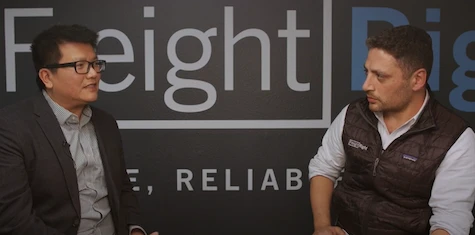
Founder & CEO of Freight Right Global Logistics, Robert Khachatryan, sat down with Tuck Ly, Vice President of Clearpoint International, to discuss the major issues affecting the global supply chain and port congestion

Some exciting news from our corner of the logistics world—our CEO, Robert Khachatryan, has been shortlisted for the The LA Times Studios - LA Executive Leadership Awards.

Last week's transpacific GRI slowly comes down as carriers test market resilience ahead of Golden Week.
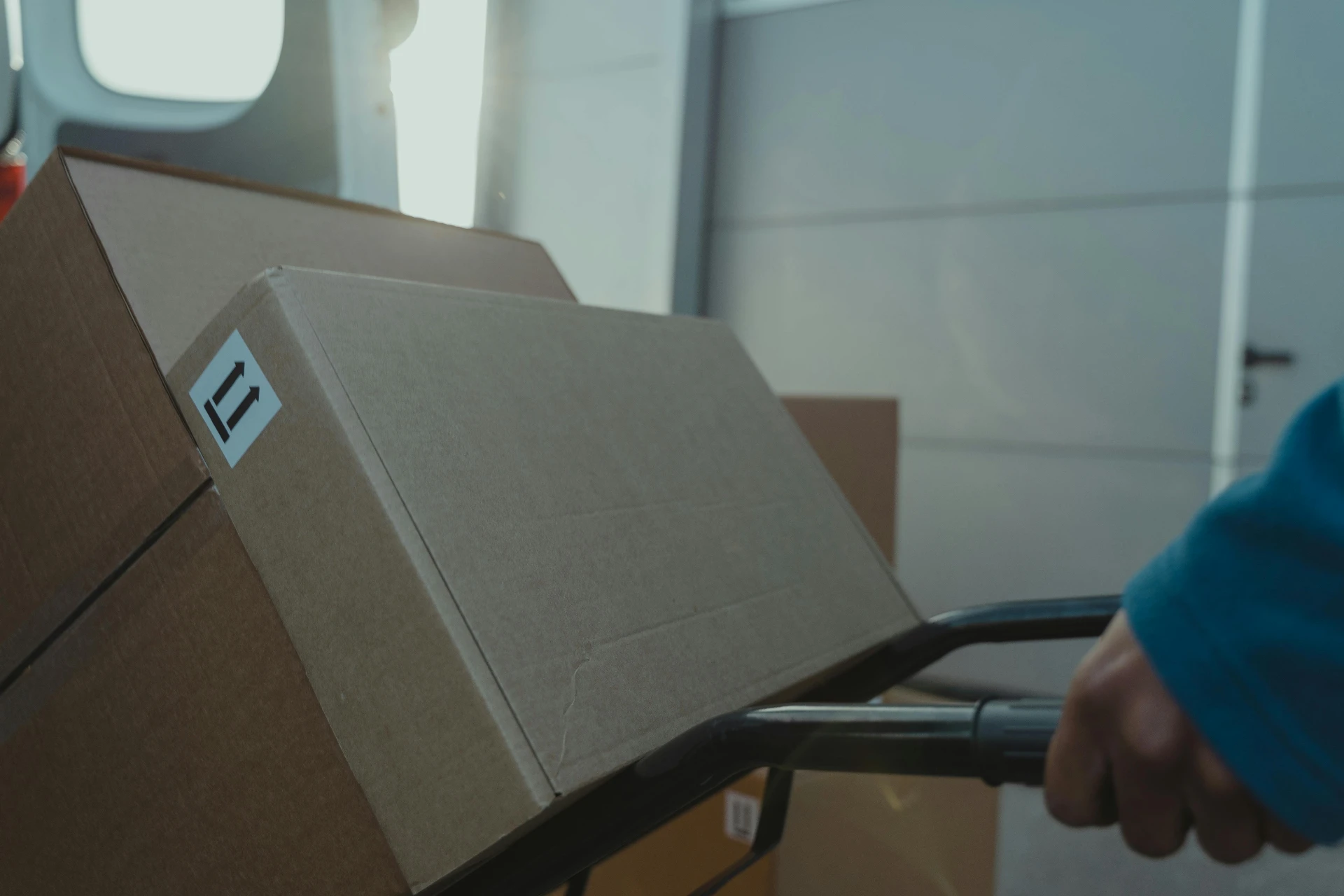
Freight Right CEO Robert Khachatryan joins the E-commerce Coffee Break podcast to share insights on shipping large, heavy, and high-value goods internationally, avoiding hidden costs, and expanding into 45+ markets without a local presence.
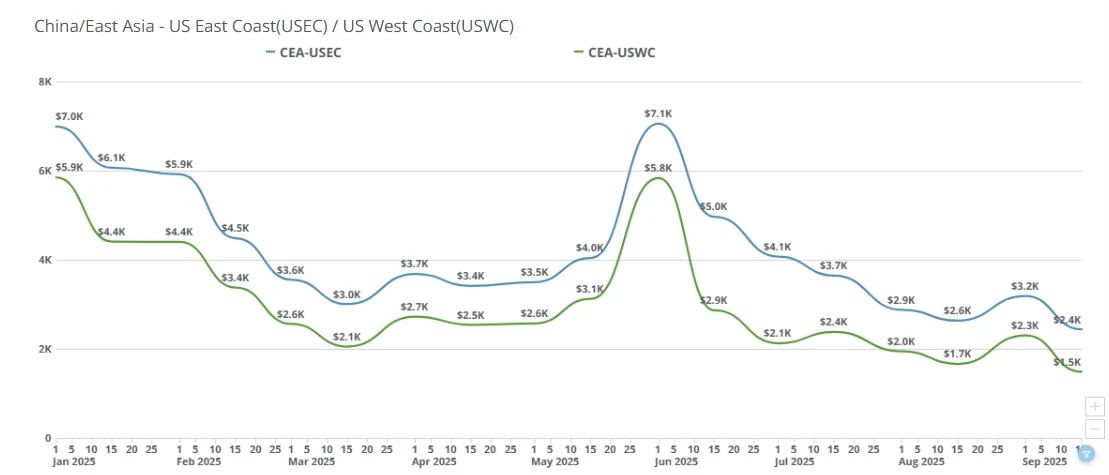
China–US ocean spot rates eased WoW as early-September GRIs faded. USWC nears trough, USEC softens, and fierce forwarder pricing persists ahead of Golden Week.
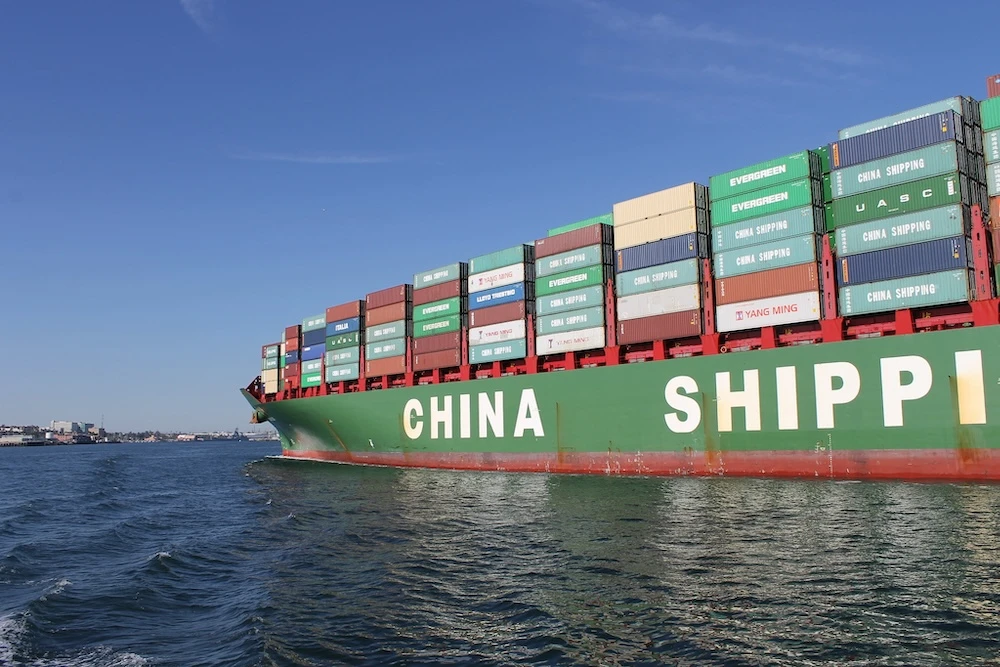
Explore the journey from ‘Buy Now’ to your home in our China-US Ocean Freight Shipping Guide. Discover the trade, environmental impact, and future of shipping.
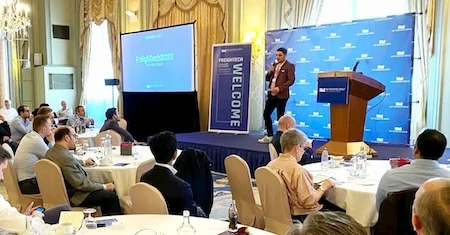
This two-day event highlighted integral information about technological advancements for freight-forwarders.
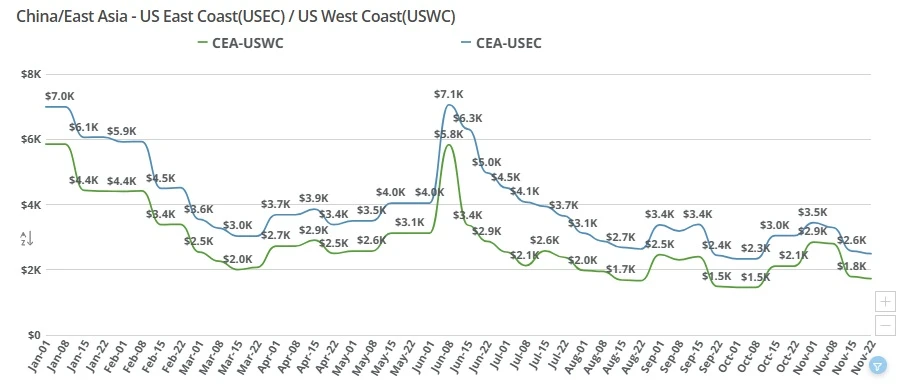
Transpacific ocean freight rates dropped sharply this week as weak import demand and the Thanksgiving holiday slowdown pushed China–US West and East Coast spot prices to new lows. Get the latest market drivers and outlook.
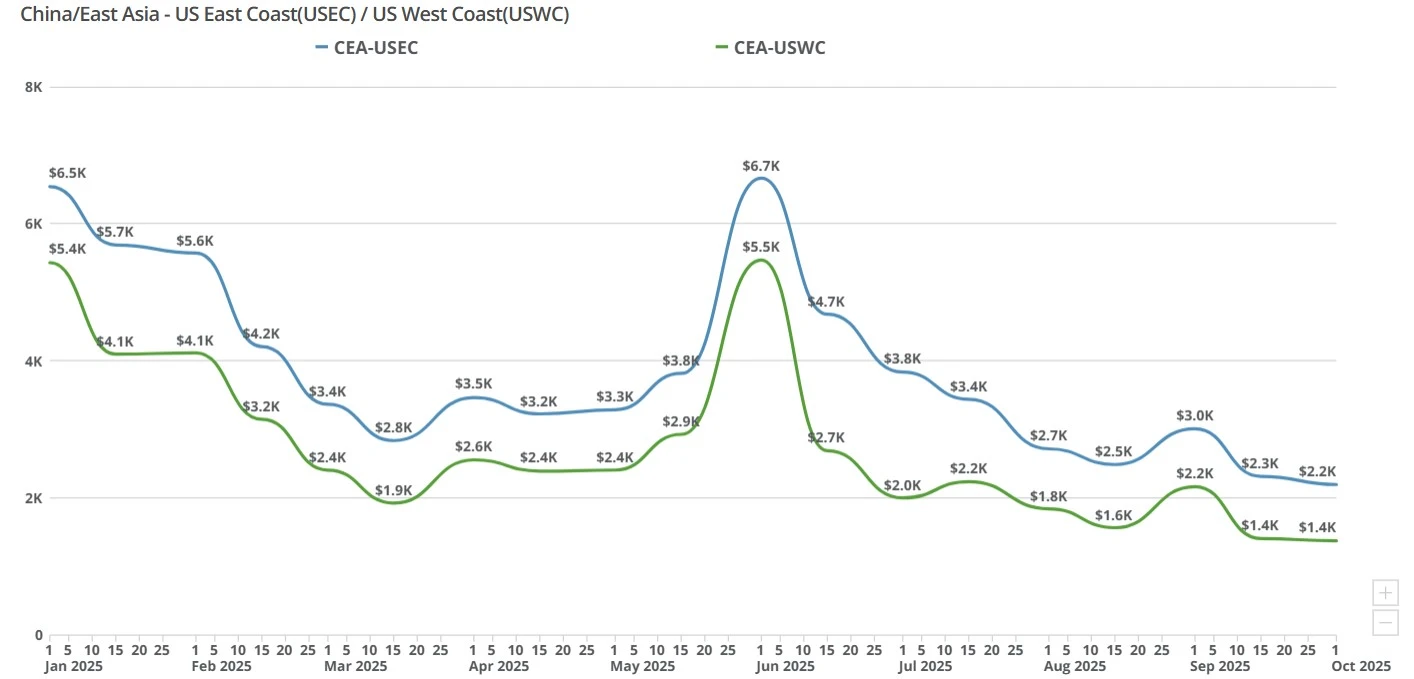
China-U.S. freight rates stayed flat this week as Golden Week factory closures paused bookings and kept ocean freight markets calm.

Freight Right now offers quality control and production visibility thanks to our most recent alliance.